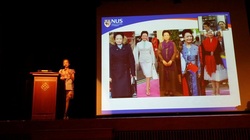 It was my great honor to be invited to make a spotlight presentation for the Chinese Internet Research Conference held at Hong Kong Polytech University this year! Thanks to David Herold, the organizers, and the steering committee for the flattering and daunting task! I still vividly remember that in 2007, I was also very fortunate to be given the top student paper when CIRC was held in Texas A&M hosted by Randy Kluver. Now seven years later, I ask myself what better I can offer to the community. I am not sure whether I have become a better researcher but at least, I am no longer alone. This time I have two fabulous collaborators, Dai Jia and Yang Tian, both from Tsinghua University. Their diligent working attitude and generous support have been the most critical reason why the paper is all possible. I opened the presentation with an example of China's current first lady, Peng Liyuan. While the international society sees Peng as the first ever Chinese first lady who can rival Obama's Michelle, many Chinese know Peng as a popular star. She has appeared in the first ever Spring Festival Gala and since then, her songs have been hits in China. Some media reports praise her for enhancing the national image by smiling and posing to the cameras. And for many Chinese, the fact that we know her, or her voice, so well has brought a sense of familiarity to the new leadership. Both the internal and external roles Peng has played in China's political life have every thing to do with her life of being a popular singer. I continued saying that this is definitely not just a Chinese case. The blurring boundary between popular culture and politics has been witnessed around the world. This observation has brought some scholars a great deal of uneasiness. Popular culture turns people from rational citizens to passive spectators, who watch their favorite stars preform but make no actions themselves. They may also become fanatic followers, who blindly do whatever their idols ask them to do. The fascination with celebrities makes citizens pay more attention to superficial qualities such as how one looks or how one speaks, and ignore the substantial criteria of being a politician such as experience, policy ideas, and visions. However, this worry is nothing new. As early as in the Ancient years in China, poets (popular singers at that time) already used poems (popular songs at that time) to mock and criticize the emperors and their empires. I argue that what we should worry about isn't whether popular culture is good or bad for politics (because politics is never simply good or bad). What we should worry about is why we still know so little about popular culture and politics, the endless seeking for pleasure, the strong desire for emotions, the structures of feeling! I argue that it is because our theoretical perspectives to examine politics are limited. One idealistic perspective sees everyday politics as deviant cases from the ideal model of democracy, such as rational debate indicated in Habermasian public sphere. Another realistic but a bit cynical perspective sees politics as power competition. It is all about exchange of interests (e.g., Bourdieu's theory of capitals). It is my argument that we should look at politics as performance. If we take this perspective, our focus is no longer on what is right and what is wrong. Politics is a matter of aesthetics and taste. We should ask, what is preferred, what is enjoyed, what is appreciated. We also would not see politics as a battle between the powerful and the powerless. How does the powerful repress the powerless, how does the powerless fight against the powerful. Instead, we talk about a relationship of performers vs. audiences. The dynamics of this relationship is much more subtle and complicated than simply being a competition among powers. Think about it: A show is not a show without audiences. If we see politics as performance, we may ask why celebrities want to perform politics. An obvious reason is to say celebrities use these political issues to keep their names in news. But why news? Why not the list of parliament members? It is because the importance of mediation is unprecedented nowadays. Although popular culture has always been a part of political communication, what marks our age is the extreme importance of mediation. We now have celebrities who are famous for being famous. They have no distinctive background, they have no outstanding achievement, they are not even pretty. Think about Furong Jiejie. What has made them so well known is the repeated exposure in media coverage. I concluded the theoretical part of this presentation with a research agenda, dictated by the perspective of politics as performance. I ask:
Although there is another methodological point I made about network analysis, I hope readers can stop at the theoretical points and think about how a perspective of politics as performance could inform our inquiry about Chinese Internet. A digital copy of the presentation is not posted in response to the conference audiences' concern of leaking privacy information of the celebrities and their followers. You are always welcome to write to me for the slides!
1 Comment
|
Weiyu Zhang
I am an Associate Professor at Department of Communication and New Media, National University of Singapore. Categories
All
Archives
January 2019
|
 RSS Feed
RSS Feed
